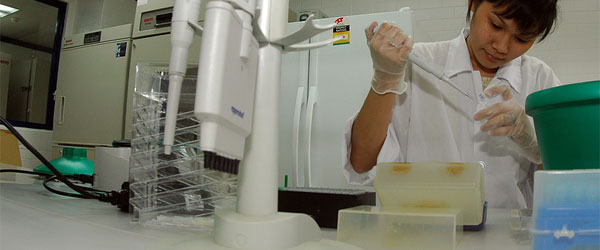When I was in graduate school, it seemed that almost no one aspired to work in industry or be part of a company. But times are changing. Now, when I go to conferences and talk to scientists in training, I am asked, “how do I get a job in a company?” and “How did you get your job?”
This is not a question I can answer in five minutes or less, or in between visitors to my poster at ASM. So I’d like to write a couple articles on this topic beginning with one on the skills to develop and acquire to make yourself attractive to an industry hiring manager.
I am glad that industry and biotech R&D science is gaining in popularity among the new generation of scientists and they are actively asking the right questions to position themselves better for when the time comes to apply for jobs. In this first article, I’d like to tell you more about the skills and qualities that will make you an asset to a biotech company. In a future article, I can tell you more about how I got my job and we can also talk about the different industry career paths and how to excel in biotech company culture.
1. Know how to search for patents. If you plan to go for an R&D position, then spend some time now learning how to find information in the patent and patent application databases. Focus on reading the claims. The claims of the patent tell you what part of the invention is protected and what is not. Having an understanding of how patent claims are written to protect an invention will be impressive to an employer. The next time you are using a “patented product” look up the patent number – it’s usually in the fine print of the manual. You’ll understand the product much better. At work, you will never be making legal decisions or interpreting the patent on your own. But you will be asked to read the patents to give your opinion and to find all the relevant intellectual property in an area and be able to discuss it with a group.
2. Don’t shy away from public speaking. Working in a biotech company requires you to be outgoing and to be comfortable speaking in front of groups. Those groups could be your team but more often it may be directors and vice presidents. You may be presenting a data to the heads of a company, trying to convince them to spend money on your product idea. Or, you may be helping marketing by giving a seminar at a university or at scientific conferences. It is important not to shy away from these opportunities to be in the limelight. You want the heads of the company to know who you are and the quality of your work. So I recommend, if you are not doing a lot of public speaking now, such as department journal clubs and seminars, then get yourself into the rotation and make yourself do it. It just takes practice and scientists who can and do speak in public are promoted faster.
3. Collaborate with a local or a favorite biotech company. The very best way to get an idea of how biotech views science is to work with a company directly. You can do this a number of ways. You can offer to perform a side project that shows the capabilities of a company’s product and co-publish together. If you have an idea for a product or a product improvement, you can see if the company will support you in developing it further. My company does this and we love it. We don’t have the capacity to perform certain technologies in house, so by working with researchers we can generate data that would not be possible. Here are two examples: one is a poster with T-RFLP analysis for metagenomic analysis and the other is a study on a new Soil RNA stabilization product using soils collected in Antarctica. Neither of these projects would have been possible without the work by the collaborating lab. In the first poster, the scientists were undergraduates so this was especially rewarding. When they presented this work at ASM, people were incredibly impressed that this was done by undergraduate students. My lab did all the DNA preps and their lab did all the PCR and analysis (the hard part). It was a win-win situation.
Working with a biotech company on a project is a great way to understand the needs of biotech in science reporting and how to communicate science from a different perspective.
If you are too busy to take on a side project, then offer to manage a summer student or undergraduate student to partake in a biotech project with commercial value. We do this too, currently working with a group at the University of Maine that gave their “Upward Bound” student a project using our products.
The benefits of doing this are many fold. The biotech company will often pay your way to a conference so you can present the work in a poster or talk. Or they may even invite you to be a featured speaker at a large event. And with your data, they can publish “white papers” which are disseminated far and wide and can give your work more exposure to the community. We even publish these in Biotechniques in the “Advertorial” section.
And of course, a letter of recommendation from the director or managers of R&D at a biotech company will carry a lot of weight when you are going head to head with someone else without commercial science experience.
4. Get along with others. This might sound obvious, but, we all know that in life there are always people we do not get along with. In academics, we can usually ignore them since so much of research is independent and not collaborative. But in a company it is not the case. You will need to learn how to manage politics and to work with groups of people, some of whom do not get along with each other, and, for one reason or another, will not get along with you. This is a difficult skill to develop and some people never do master it. Those people will not be promoted quickly in the company either.
My suggestion is to practice not holding grudges. As a postdoc, I worked for a PI that would always tell me “everyone is entitled to a bad day”, meaning, when another colleague was less than cordial or disagreeable, he would give them a pass. Basically, he said to let it go and assume the person is having a bad day and not take it personally. Now, whenever I am treated in a way I don’t appreciate, I say the same thing to myself. Maybe that person is having a bad day. I’ll give them the benefit of the doubt. It’s a good way to be and you’ll have a lot less mental stress if you can do it.
5. Don’t be afraid to go outside your comfort zone and try new things. In biotech, to solve a problem or to develop a certain technique, you may need to incorporate new assays that you’ve never done before. Embrace the opportunity to add a new method to your arsenal. Sometimes it may be better to collaborate with a lab that has expertise in the method or to outsource to a company. But if you have the time and the money to learn something new and different, show your managers how fast you can adapt. Dealing with change is a big part of biotech science and those that handle change well tend to have an easier time in biotech and score higher in performance reviews.
In your academic life now, I would recommend that you learn many techniques, but not only for the reason of knowing the skill. For the reason that it teaches you confidence in yourself and your ability to learn anything at all. It will help you to confront any new challenge with ease and make you a stronger scientist and a leader to your peers.
6. Be friends with your sales people. One of the best ways of actually landing a job in a biotech company is to know someone in the company who knows you and knows the kind of person you are. Most biotech companies pay their employees a bonus for referring people who are hired. So the employees of companies are always looking for new talent to bring in to their organization. If you had the chance to collaborate with a company and do research for them, you’ll have an even easier time, since you’ll be dealing with marketing people and most likely the R&D people. They will already know how capable you are and how well you get along with others.
Some of you work at colleges or small schools that do not get sales reps visiting very often. In this case, just stay on good terms with the sales people who contact you through email and when you go to scientific conferences, be sure to visit the vendors. If you have a particularly favorite company, make sure to say hello and tell them how much you like their products. You can try to get the name of an R&D manager from the booth staff that you can talk to about setting up a collaboration.
Another really good way to stay in contact with companies is using socal media such as linkedin or twitter. Twitter is a great way to chat with individuals from your favorite company and give them positive feedback. Almost all of the biotech companies have a couple employees using twitter to chat with scientists and stay on top of current science events. If you join twitter, make sure to follow @bitesizebio and me at @suzyscientist.
7. Never ever burn any bridges. This is probably the single most important advice I can give you and that you will ever receive. This is so critical to your career success and it is never too early to adopt this motto. This means, always leave every place of employment on good terms. In our world, you just never know when someone you were rude to will show up again. Even though academics and industry are very separate, so if you have a bad parting of ways with a PI, it won’t have as strong of a negative effect, you still want to make every attempt to smooth out any misunderstandings if you can.
Now, sometimes burning a bridge cannot be avoided. I know. I’ve done it. But if I could do it over, I would have handled things differently. You might be thinking, “well you’ve done pretty good for yourself anyway.” Yes, but, it was rough going for a while. So save yourself the trouble now. If you leave a postdoc on bad terms, it will be difficult to get another postdoc or an academic position again. If you leave a company on bad terms, it could become very difficult to get hired again.
I know that sometimes it can be very tempting to want to lash out verbally when you feel someone mistreated you at a job. Don’t do it. And when interviewing for the next position, NEVER talk negatively about the lab you just left. I can guarantee that if you do, you won’t get hired.
Summary
As part of your training, you are going to learn a lot of techniques and you will develop your knowledge in your area of expertise. It doesn’t matter to me how many techniques you know as long as you know the ones I need you to know to start a project with the least amount of down time. Industry labs need people that can get up to speed quickly and not spend excessive time learning basic techniques. And we want people who are not afraid to learn and can get themselves trained quickly on new methods. Being self-sufficient is part of the Ph.D. process so being able to give examples of times where you learned a new difficult skill or technology on your own and quickly will make a very good impression to hiring managers.
As Greg Lucier said in his presentation on leadership, it’s not only about what you know, but also how fast you can learn.






